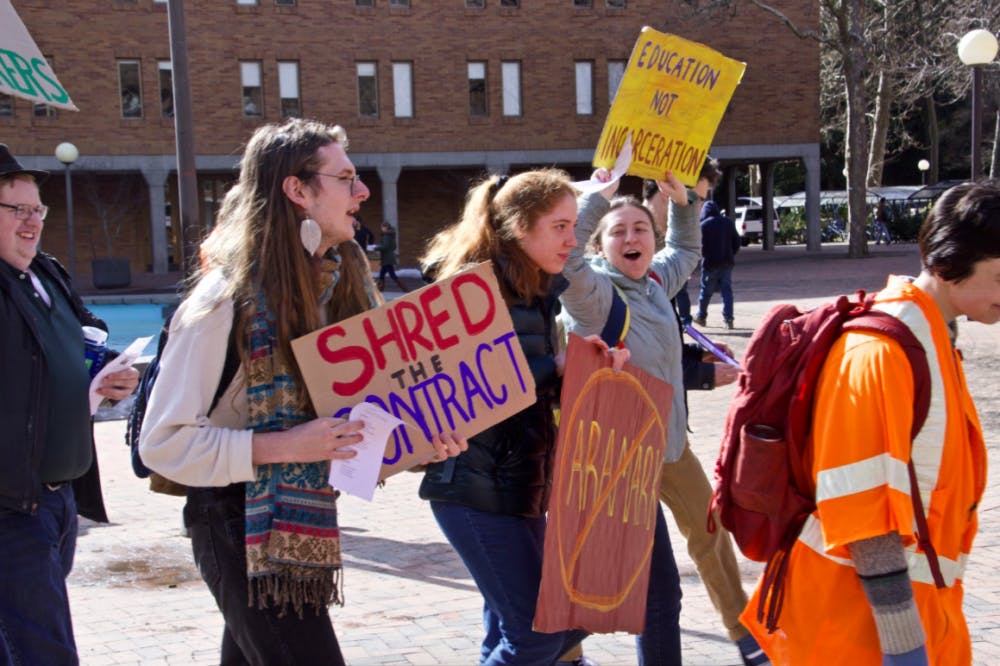
By Cami Sires
Western’s 10-year contract with Aramark is expiring in 2021. According to Western’s online Dining Transitions page, Western is deciding if they will sign a new contract or become a self-operated dining service.
Students in the Shred the Contract club are encouraging the dining system to change to a self-operated system.
Jennie LeVeque, a second-year Western student who is involved in the Shred the Contract club, said that the reason Shred the Contract is fighting for a self-operated system is because services like Western’s old contract with Sodexo and other companies have the same practices as Aramark does.
“A self-operated system would give us more autonomy and will give the students more opportunity for feedback and more control over our dining system,” LeVeque said. “Practices such as supporting local farmers, making sure that there's a lot of plant-based options and making sure that we're providing real food.”
In 2011, Western Today published an article where Paul Cocke, director of communications, said Aramark's new partnership with Western was focused on priorities important to students and the university. Specifically on sustainability and nutritious food, local partnerships and significant student involvement.
According to Aramark’s website, depending on the institution’s goals, Aramark can align sustainability efforts with the community, such as local purchasing initiatives, creating green structures to operate buildings more efficiently, or building programs and platforms to educate and engage the campus community.
Dana Ericksen, fourth-year Western student who is involved in the Shred the Contract club, said movement in sustainability since Aramark signed a contract with Western has been too slow.
“Aramark makes their profits through a system called kickbacks, which means they have big deals with other big food corporations like Nestle and like Tyson chicken,” Ericksen said.
Kurt Willis, Western residences’ associate director of business and information system, said in agreements like the one between Western and Aramark, it’s not uncommon for the contractor to negotiate annual pricing arrangements with many different food producers in order to get the best price for their client.
“Western is not a participant in those pricing discussions and does not receive information from the dining contractor about their contracts between them and their food purveyors,” Willis said.
Ericksen explained that these deals Aramark makes with big companies are compromising the goal that Western made when they joined the Real Food Challenge.
The Real Food Challenge mission is to give power to the youth and universities to create a healthy, fair and green food system. The challenge aims to shift $1 billion, which is 20% of existing university food budgets, away from industrial farms and unhealthy food, and toward real food by 2020.
The Real Food Challenge defines “real food” as local, community-based, fair, ecologically sound and humane food sources.
When Western joined the challenge, the WWU Real Food Initiative was that the university was committed to the goal of allotting 25% of campus dining halls purchasing dollars to “real food” by 2020.
“Our [Western dining hall] local, regional and community-based purchasing through February 2020 is 38.7%,” Willis said.
Shred the Contract has looked at schools like Central Washington University (CWU) for inspiration for what Western’s self-operated system could look like.
Dean Masuccio, CWU director of Dining Services, said being a self-operated university provides CWU with opportunities to adjust to an ever-changing environment.
“We are now in year two of our very own Wildcat Neighborhood Farm, fully funded by our dining program, and part of Auxiliary Enterprises, which dining is a part of,” Masuccio said. ”This allows us direct access to the freshest available produce, in addition to being a part of the decision-making process of what is planted for our use within our operations.”
The University of Washington, Washington State University and Eastern Washington University are also on self-operated dining programs.
“Frequently we engage in dialogue and collaboration and share the best practices with one another to provide each program the opportunity to best serve our students,” Masuccio said.
Lindsey Macdonald, Western’s interim director of the Office of Sustainability, has been advocating for changes similar to CWU.
Macdonald said that students and staff from across Western’s campus have been working to figure out food insecurity and sustainability of the university’s food and waste, before COVID-19, but the current crisis has made the university narrow in on these issues.
Macdonald said Aramark is a key partner in the Swipe Out Hunger initiative.
According to Western’s website, Swipe Out Hunger helps students with food insecurity, it allows students to swipe into the dining commons for free provided they have a Western ID card .
“We could not run this program without dining services’ approval and support,” Macdonald said.
Macdonald said a self-operated system could help combat food insecurity better, or possibly be more expensive, which could create added challenges for food access.
“It really depends on the details, there is not one sweeping answer that will be true in all cases,” Macdonald said.
Ericksen and LeVeque explained that the dining hall service debate has been long awaited.
Western’s website provides a dining transitioning timeline that shows dates and provides evolving resources, with definitions, facts and figures, and guides to the processes and regulations throughout the dining hall transition.
“The decision on whether the university will lean towards a new contract or self-operation was supposed to be announced around the end of March, and since that has been put on hold all we’ve been told is COVID-19 has delayed the decision,” Ericksen said.
Willis said since COVID-19 there has been conversation about self-operating versus re-bidding the dining contract but no decisions have been made yet.
Ericksen said the Shred the Contract club is looking for more transparency on what is happening during this delay and when the university will start discussing the decision again.
“It’s frustrating because the contracts are usually 10 years long, so it's a big deal,” she said.





